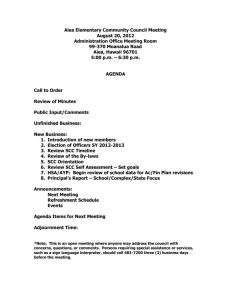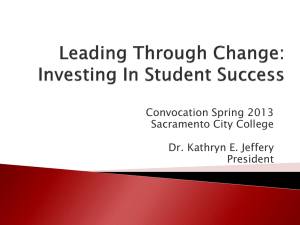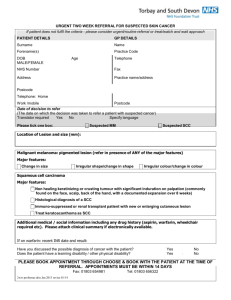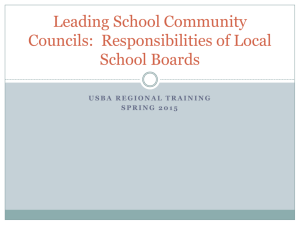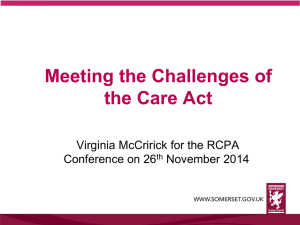ABOUT YOUR CONTACT WITH THE PACIFIC UNIVERSITY STUDENT COUNSELING CENTER
advertisement
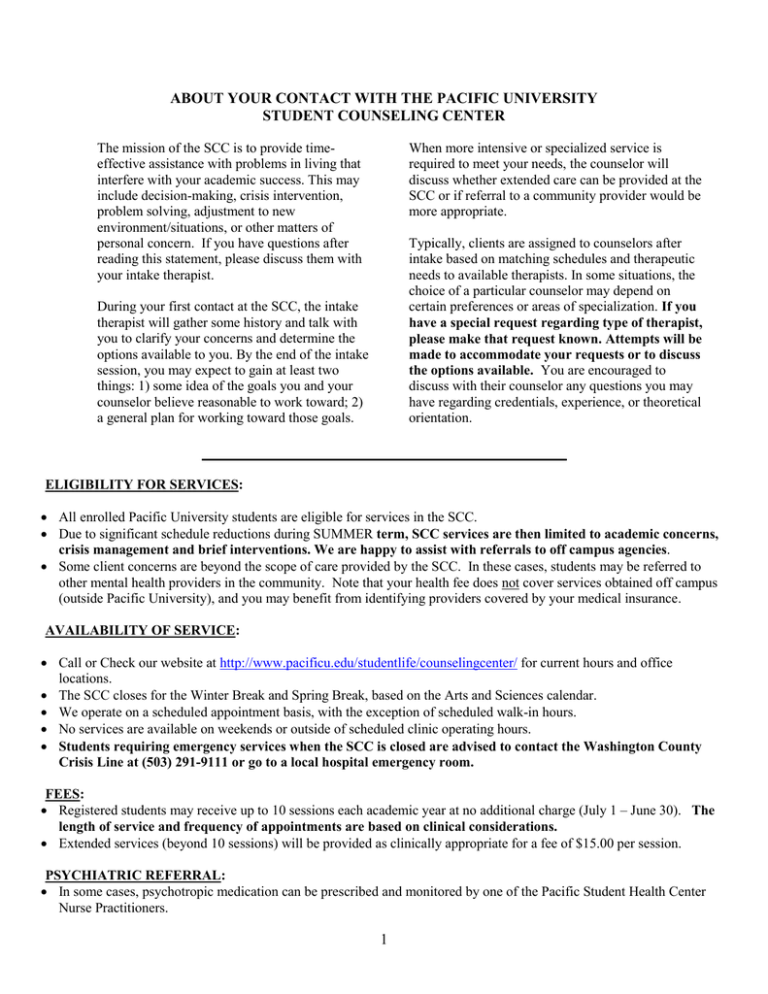
ABOUT YOUR CONTACT WITH THE PACIFIC UNIVERSITY STUDENT COUNSELING CENTER The mission of the SCC is to provide timeeffective assistance with problems in living that interfere with your academic success. This may include decision-making, crisis intervention, problem solving, adjustment to new environment/situations, or other matters of personal concern. If you have questions after reading this statement, please discuss them with your intake therapist. When more intensive or specialized service is required to meet your needs, the counselor will discuss whether extended care can be provided at the SCC or if referral to a community provider would be more appropriate. Typically, clients are assigned to counselors after intake based on matching schedules and therapeutic needs to available therapists. In some situations, the choice of a particular counselor may depend on certain preferences or areas of specialization. If you have a special request regarding type of therapist, please make that request known. Attempts will be made to accommodate your requests or to discuss the options available. You are encouraged to discuss with their counselor any questions you may have regarding credentials, experience, or theoretical orientation. During your first contact at the SCC, the intake therapist will gather some history and talk with you to clarify your concerns and determine the options available to you. By the end of the intake session, you may expect to gain at least two things: 1) some idea of the goals you and your counselor believe reasonable to work toward; 2) a general plan for working toward those goals. ELIGIBILITY FOR SERVICES: All enrolled Pacific University students are eligible for services in the SCC. Due to significant schedule reductions during SUMMER term, SCC services are then limited to academic concerns, crisis management and brief interventions. We are happy to assist with referrals to off campus agencies. Some client concerns are beyond the scope of care provided by the SCC. In these cases, students may be referred to other mental health providers in the community. Note that your health fee does not cover services obtained off campus (outside Pacific University), and you may benefit from identifying providers covered by your medical insurance. AVAILABILITY OF SERVICE: Call or Check our website at http://www.pacificu.edu/studentlife/counselingcenter/ for current hours and office locations. The SCC closes for the Winter Break and Spring Break, based on the Arts and Sciences calendar. We operate on a scheduled appointment basis, with the exception of scheduled walk-in hours. No services are available on weekends or outside of scheduled clinic operating hours. Students requiring emergency services when the SCC is closed are advised to contact the Washington County Crisis Line at (503) 291-9111 or go to a local hospital emergency room. FEES: Registered students may receive up to 10 sessions each academic year at no additional charge (July 1 – June 30). The length of service and frequency of appointments are based on clinical considerations. Extended services (beyond 10 sessions) will be provided as clinically appropriate for a fee of $15.00 per session. PSYCHIATRIC REFERRAL: In some cases, psychotropic medication can be prescribed and monitored by one of the Pacific Student Health Center Nurse Practitioners. 1 Psychiatric referrals may also be made by your therapist to psychiatrists or psychiatric mental health practitioners in the greater metropolitan area. CLIENT RIGHTS: Ask to be informed about counseling, any risks it might involve, and possible alternatives. You may request or refuse any particular technique or withdraw from treatment at any time. You should expect to receive considerate and respectful services. You have the right to receive service regardless of sex, disability, sexual orientation, race, color, creed, religion, age, or national origin, if staff feels competent to offer appropriate services (if not, a referral will be made). You can expect confidentiality in accordance with applicable laws and ethical codes. Ask for information regarding counselor qualifications and counseling approaches. AUDIO AND VIDEO RECORDING: SCC wishes to provide the best services possible to students. We are continually working to enhance our own skills as counselors. Toward that end, and only with your written permission, psychologists-in-training routinely audio-tape and/or video-tape sessions with their clients. These tapes are used only in professional supervision, are confidential, and are erased after they are reviewed. If you do not want sessions taped, you are under no obligation to consent to this request. SUPERVISED CLINICAL STAFF: Some services at the SCC are provided by Psychologist Residents and graduate student counselors from Pacific’s School of Professional Psychology and George Fox University. These therapists are supervised by a licensed psychologist or psychologist resident on staff at the SCC. Your counselor will provide information regarding their credentials during intake, and you will be told who is supervising that therapist if they fall into a training category. IF YOU ARE DISSATISFIED: Although it is not possible to guarantee outcomes, the SCC is committed to providing quality services. If you are dissatisfied with any aspect of the services provided, you are strongly urged to speak with your counselor about this. If the difficulty cannot be resolved by working with your therapist, you may address concerns to the Director of the SCC. Copies of the ethics codes, relevant laws, and administrative rules of the professional licensing boards are available on request. ALTERNATIVES TO THE SCC: Alternative private providers of psychological and counseling services are available in the community. Some mental health conditions are responsive to medical interventions. We will assist you by providing information on these alternatives if you wish, or if we believe alternative services will best meet your needs. 2 OUR PRIVACY PRACTICES: CONFIDENTIALITY: Our counselors strive to make the SCC a place where you can feel safe talking about personal matters. Information gathered during a session is confidential and is shared among staff at the Center only for purposes of clinical consultation, supervision and training. Similarly, videotape, audiotape and direct observations of the client-therapist interactions are used only for these purposes. For some high security (i.e., government/Peace Corp/law enforcement/transportation) employment positions, you may be required to release medical records as part of a background check. We will only do so with your written authorization specific to mental health records. There are, however, some EXCEPTIONS to confidentiality. Therapists may release certain information without your consent. While these types of events are rare, you should know that these possibilities exist. 1…When you communicate intent to commit a crime that may cause physical injury to another person, 2…In the event we have a serious concern that you may imminently harm yourself or others. 3…In cases of abuse or neglect of a vulnerable child or adult, 4…As a result of a court order, 5…When mental illness is used as a defense in a criminal or civil action 6…We may be required to disclose your health information to authorized federal officials who are conducting national security and intelligence activities or providing protective services to the President or other important officials. In this case alone, by law we cannot reveal to you when we have disclosed such information to the government (Homeland Security Act). 7…In the event of your death, the personal representative of your estate (whom you have appointed) will have a legal right to access your treatment records. If you have not appointed a personal representative, your relatives or others may gain access to your records. 8…Additional limitations on confidentiality apply to students under the age of 18. If you are under 18, your counselor will discuss with you these limitations. At the SCC we do NOT use e-mail to initiate therapeutic conversations, as e-mail is not considered confidential. If you provide us with your e-mail address, it will be used for scheduling and confidential survey purposes only. You have the right to complain or make inquiries if you believe your rights to privacy have been violated. In such an instance, please direct your complaint or inquiry to: Director, Pacific University Student Counseling Center, 2043 College Way, Forest Grove, OR 97116, 503-352-2191. MAINTENANCE OF RECORDS: Electronic and written records of contact with the SCC are kept secure according to legal and ethical standards set state and federal law, and by the American Psychological Association. The Student Counseling Center utilizes electronic health records which are housed on a secure centralized server and can be accessed only by current authorized SCC staff. These records are separate from all other university records. Students may request to review their records with their counselor. Relevant information from records will be forwarded to appropriate professionals only when you sign an SCC authorization to release medical records form. In compliance with state law, records are maintained for 7 years following the date of last contact, and are then destroyed. At no time is the confidentiality of records compromised. My signature indicates that I understand, authorize, and request counseling services involving assessment, treatment and/or referral: Signature: ____________________________________________ Date:_________________________ My initials below indicate my consent/preference regarding permission to record: I agree to audio-taping of my counseling sessions: __________ I agree to video-taping of my counseling sessions: _________ I do not agree to any form of taping of my counseling sessions: ___________ 3
